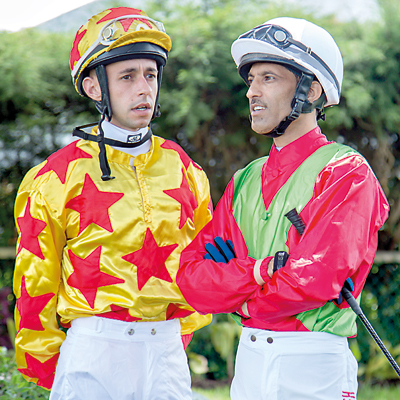Local Horse-racing making great strides to establish itself

Perkins (L) and Singh prior to a race
After the revival of horse-racing in Sri Lanka in 1981, the equestrian sport has had its ups and downs. Though horse-racing is not listed as a sport in Sri Lanka, it is accepted as an equestrian sport worldwide and a booming industry wherever in the world it is found.
Time and again Sri Lanka has had ups and downs since it hosted the inaugural race in 1875 in Nuwara Eliya, followed with a ban in 1956 by the then government. The country had 3 racecourses- Colombo, Boosa and Nuwara Eliya- of which the last was the only existing one when the sport returned in 1981.
Over the years, Sri Lanka had its major share of support from India, where horse-racing is still a big industry, through trainers, jockeys, track marshals and officials. Today, with the sport changing its caretaker from Sri Lanka Turf Club to Royal Turf Club (RTC) in February 2016, horse-racing is gradually reaching international standards with jockeys afforded their due prominence, unlike in the past.
In the past few years, Indian jockeys have overshadowed our local riders. However, with the recent changes, local jockeys too are showing their keenness to improve in standards and techniques. The latest addition to the team of jockeys comes from France, with Charles Perkins making a dream debut at the RTC Magic Million Raceday on April 15.
Perkins, 30, is a jockey with international experience and has ridden in France, England, Hong Kong, New Zealand and is a household name in Macau. Riding ‘Krabi’ to victory in the 1,400-metre Class 5 Handicap Race for the Dedigama Group Challenge Cup, Perkins transformed his debut to a memorable one, and explained what it takes to become a professional jockey.
“I have been riding horses for many years now and what comes foremost is the fitness and mental stability. I do a lot of exercises like running, swimming and work out regularly at the gym, to be fit and slim. It’s important to maintain a slim body with an average weight, if you want to become a professional jockey,” Perkins stated.

Irvan Singh (L) and Charles Perkins (R) training in Nuwara Eliya - Pix RTC
Previously, Sri Lanka never had proper guidelines to develop or train jockeys, though much attention was given for the glamorous events held throughout a calendar year. Suddenly, the focus shifted in the past decade, when local horse owners started bringing down top thoroughbred race winners from India, along with its familiar jockeys.
“Though there may have been other intentions in borrowing horses and jockeys from India, particularly for the Governor’s Cup and the Queens Cup, it had a positive impact on our jockeys in the long run, unlike many assume. It also paved the way for other local horse owners to bring down horses and jockeys, while some opted to make it a point to train local jockeys to become more competitive and professional. I believe the local jockeys have improved over the years through this,” said a horse-racing enthusiast, who did not wish to be named.
Today, it is virtually an annual pilgrimage for top Indian jockeys to make the Nuwara Eliya season in April, for the 3 top events held two weeks apart. Some of them are Irvan Singh, Imran Khan, Mohamed Farhan, A. Vishwanath, Srinnath, Kuldeep Singh, Praveen Shinde and Aneel. During their stay the RTC also makes it a point for local riders to train with the Indians, to gain expert knowledge.
“I am a professional jockey and train hard to maintain that status. I do a lot of jogging and dieting to remain slim. I also make it a point to interact with the horses I ride, which makes my task as a jockey more comfortable. In general, I get up at 4.30 in the morning every day and exercise for over 5 hours, mornings and evenings, and also train for more than 4 hours per day,” Irvan Singh, the jockey who rode ‘Alcazaba’ to victory at the RTC-SriLankan Airline Magic Million Cup race, stated.
During their stay in Sri Lanka, both Singh and Perkins have graciously engaged and involved the local jockeys while training. This is a morale booster, besides the simulator RTC has installed in Nuwara Eliya, for the local riders. The camaraderie between local and foreign jockeys has been fruitful to horse racing in Sri Lanka, as shown in the few Class 4 and 5 races.
Both Frenchman Perkins and Indian Singh eagerly look forward to competing with the local jockeys, as the now celebrated Trainer S.D. Mahesh developed from being a rider.
“For me, every ride is a challenge. I meet new jockeys and face new challenges on the way. It’s good to meet a few Indian jockeys here in Sri Lanka, as my next destination will be India. I’m confident the Sri Lankan jockeys have all the potential to become professional riders. Next time when I come down, I hope the locals could compete in the main races and challenge the foreign riders,” Perkins explained.


